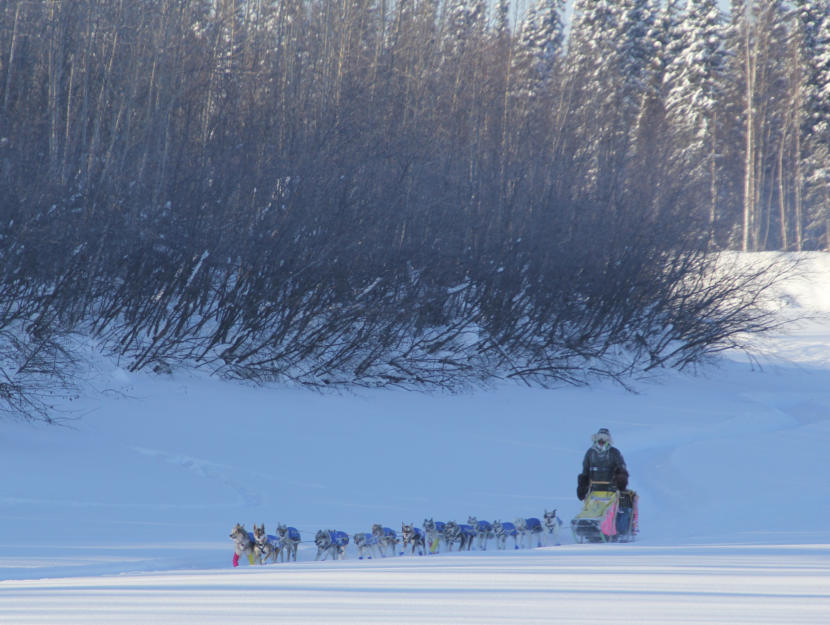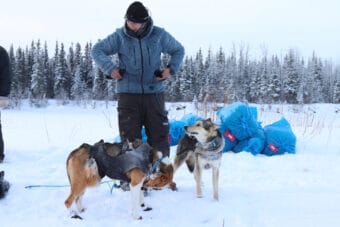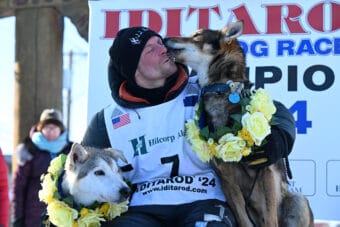
The Iditarod Trail Sled Dog Race is dropping its COVID-19 vaccination requirement for mushers, staff and volunteers in the 2023 race.
The announcement comes as mushers have been slow to sign up for the 51st running of Iditarod, with only 26 listed as of Tuesday. Past years have seen as many as 80 or 90 teams start the 1,000-mile race from Anchorage to Nome.
But Iditarod spokeswoman Shannon Noonan said having fewer mushers signed up did not affect the decision to drop the vaccination requirement.
“You know, dropping this policy may change that, but that was not a deciding factor of dropping the vaccination policy,” Noonan said.
Last year, the Iditarod said requiring proof of vaccination was necessary to protect everyone along the trail. That included residents of remote communities serving as checkpoints, where medical care is limited and an influx of people during the race could lead to an outbreak. The village of Takotna, a favorite stop for some mushers to take their mandatory 24-hour break, opted out of being a checkpoint altogether in 2022, out of concern for residents’ health.
What’s different now, Noonan said, is COVID’s declining trajectory in Alaska. State and federal guidelines aren’t recommending vaccination requirements for big events like the Iditarod.
“We in no way are dropping the vaccine requirement, you know, saying that COVID is over, in any way,” Noonan said. “We are, absolutely still have, our villages and our mushers and our volunteers as our number one concern, and we’re going to continue asking and looking for input from our villages as we move forward to the race.”
It’s unclear if dropping the vaccination requirement will bring back mushers who cited the policy when they decided not to race the Iditarod in 2022. That includes Wade Marrs, who had mushed the previous 10 races and placed 4th in 2021, matching his previous best finish, but said he wouldn’t race in 2022 because of the vaccination requirement.
Five-time Iditarod finisher Monica Zappa, of Kasilof, has been skeptical of the vaccines and opposed the Iditarod’s requirement. And while she said her decision not to race the past two years also involved the age of her dogs and the cost of maintaining a race kennel, Zappa said she’s glad the race is dropping the requirement.
“I mean, I’m not like begrudging the race, but sometimes just in life in general, you have to let people be the controllers of themselves a little bit, too,” Zappa said.
State health officials continue to encourage Alaskans to get updated COVID boosters. In June 2022, unvaccinated adults were more than four times more likely to be hospitalized with COVID compared to those who’d had at least one booster.
Noonan, with the Iditarod, said race officials are still discussing protocols for COVID-19 testing during the race. In 2021 and 2022, a positive test meant mushers or staff had to leave the race.
Meantime, Noonan said the Iditarod is hoping more mushers — some wrapping up their first busy tourism season since before the pandemic — will sign up for the 2023 race.
If the start were today, the 26 teams currently listed would be, by far, the fewest in Iditarod history. Mushers can still sign up, but the entry fee increases at the end of November.
The Iditarod is set to start March 4, 2023.



